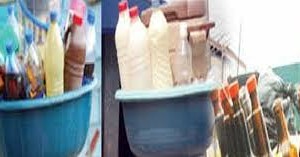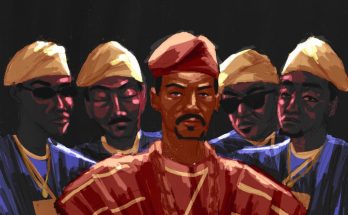 “Mama shally, e joo e fun mi ni bullet kan ati ghenghen meji”– these are the words of an area boy to a local herb seller, those popularly known and called “Alagbo”.
“Mama shally, e joo e fun mi ni bullet kan ati ghenghen meji”– these are the words of an area boy to a local herb seller, those popularly known and called “Alagbo”.
The act of taking locally made herbs dates as far back as the existence of leaves and trees. Our forefathers found a miracle in nature which presented itself in roots and leaves. They combine some of them to make Agbo- a Yoruba word for locally made herbs combined and used in making concoction that could be used to treat various diseases. Then, there was always an Agbo for treating an ailments, ranging from diabetes, to sickle cell anaemia, to high blood pressure, to headache, cold and catarrh and even infertility. During this period these herbs were taken solely based on the prescription given by the elderly ones and Agbo whenever taken is usually to prevent or cure a sickness. However, with the arrival of modern medicine, Agbo consumption declined and much more preference is being given to modern forms of treating illnesses. This preference for modern medicine led to a reduction in specialized Alagbos (agbo sellers/makers) and they became fewer with each passing day.
Now, from the recent past, the Alagbos have been distinguished as roadside herb sellers whose major business is to sell already prepared mixtures of leaves and roots, either in powdered forms or as ‘cocktails’. These Alagbos unlike their ancient counterparts, are profit-oriented sometimes with very little or no knowledge at all about the enterprise of Agbo making. Their major patronage use to be from the likes of commercial bus drivers and their conductors, some heavy-duty manual labourers, and some touts at the garage whose spendings are usually influenced by the hot-drinks used in the preparation of most of the Agbos. However, that era is long gone. These days Agbo sellers are patronised by both male and female, young and old, weak and strong, students and even lecturers of the Ivory Tower.
Consequently, as a result of the motive behind the business, these herbs are no longer prepared to save lives. The advent of Alomo Bitters and Orijin (which are now being used in the preparation of herbs by the Alagbos) has even given a new face to the consumption of herbs and many more people now find all sorts of ridiculous means to be involved in the business… Both the makers and consumers of locally made herbs have boomeranged, as several new variants of hot drinks and industrial herbs are produced constantly. ‘Cocktails’ such as shepe, paraga, opa–eyin, jedi, shayo, alomo, olowe, abe–igi, osomo,…will not spare your ears as you walk down the ‘street’.
Amazingly, beyond the rather cheap cost of these herbs lies a danger people may know but have refused to acknowledge. First, the source of the water used in the preparation of these herbs remains a mystery. Most times, the water used is usually contaminated but most consumers believe that the germs in the water will automatically die because they are in Agbo. We however, all know that the dangers of drinking contaminated water are endless.
Second, people no longer use herbs as a curing agent. Most herbs have been turned into aphrodisiacs (a substance taken to create an arousing sexual desire). Many men and women take these herbs with hopes of having better sexual experiences, which by the way, they get each time they take these herbs. Unfortunately, aphrodisiacs spell more harm than good. The benefits are short lived; some extra minutes in bed in other to be considered a ‘real man or woman’ as the case may be, is as temporary as it can be. The dangers of not relieving herbs-enhanced libidos are grave.
Third, the issue of combining dry gins and herbal mixtures alongside hot drinks cannot be over-emphasized. The harms it sets in motion far outweighs any attributed benefit it may have. The effects of consuming these supposedly healing Agbos are fatal and long-lived, ranging from vital organ damage, to infertility in women and impotency in men. The next time you take that herb, know why you are taking it and remember the danger you are subjecting yourself to.





